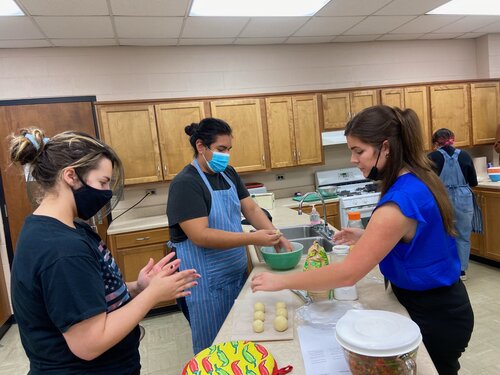WKU News
Modern Language Students Discover Connections between Food and Culture in Hispanic Cooking Demonstration
- Monday, November 22nd, 2021

A Hispanic cooking demonstration might not to be the first thing that you associate with an Advanced Spanish Composition course at WKU, but that is exactly what the students in Dr. Pertusa's SPAN 471 course were engaged in last week! Spanish syntax and sentence structure were put aside to welcome four Hispanic guests that raised their spatulas to demonstrate their favorite recipes from home: patacones and mango salad from Ecuador, empanadas from the Dominican Republic, potato omelets from Spain, and corn tortillas and pico de gallo from Mexico.
Every two years, SPAN 471 takes students through a culinary and gastronomic journey, reading and writing about the food idiosyncrasies of the Hispanic world while also exploring the gastronomic delights that Bowling Green has to offer. While learning about the nuts and bolts of food writing in Spanish, students collaborate on the creation of two issues of Del plato a la boca. The student-created food culture e-zine includes articles about Bowling Green's own farmers markets, the world cuisine presented at the International Festival every year, the color of the season at Jackson’s Orchard, and the delightful flavors of the homemade ice cream from Cheney’s' Farm, among many other topics related to food culture.
"The cooking demonstration is a classic now in the course," says Dr. Pertusa. She went on to say, “It is the culmination of our many discussions about how food is connected to the Hispanic culture and its people. After 10 weeks reading and writing about food from every possible angle and in different types of texts, having a cooking demonstration by student guests from different countries puts the icing on the cake of the course, making what students read and write about more real.”
Professors Julie Lee and Matt VanSchenkhof, from the Department of Applied Human Sciences, collaborated with the cooking demonstrations, giving their expert advice on food preparation. Also, Professor Melissa Stewart, from the Department of Modern Languages, got her apron on to serve as the "pinche" (chef’s assistant) of the evening as needed. "During the demonstration," recalls Professor Stewart, “students went from station to station, hearing about the food, preparing it, and then tasting it. Afterwards, the group tried some dishes class members had prepared at home to share as well. Half of the group was Latinx students from different places, so there was much sharing of cultural practices and linguistic differences all around. It was, as always, very lively and stimulating for everyone."
This event was supported by the Department of Modern Languages and the Department of Applied Human Sciences.

